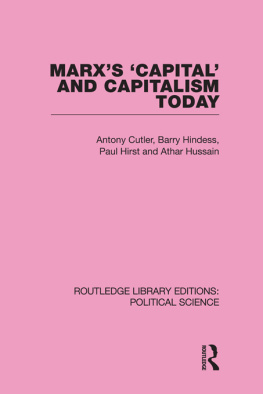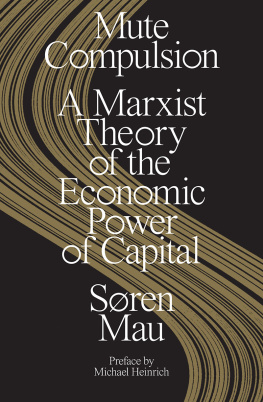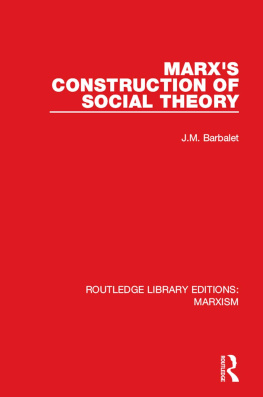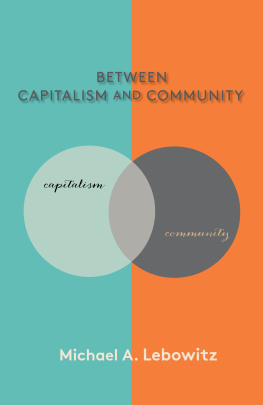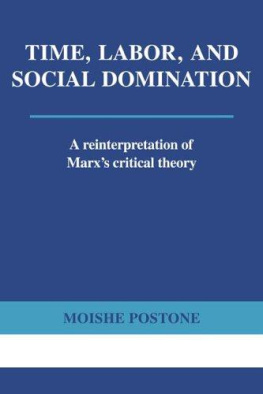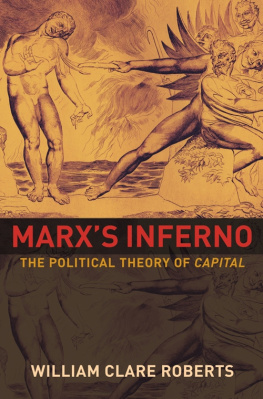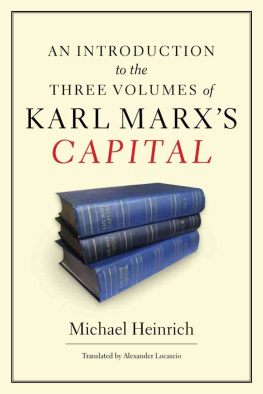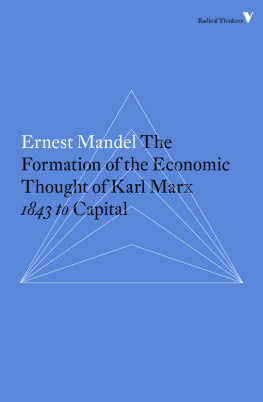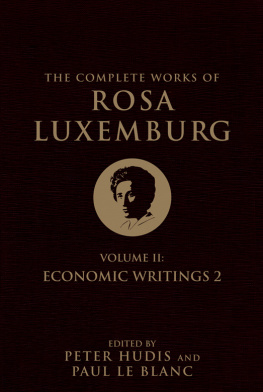ROUTLEDGE LIBRARY EDITIONS: POLITICAL SCIENCE
Marxs Capital and Capitalism Today
First published 1977
This edition first published in 2010
by Routledge
2 Park Square, Milton Park, Abingdon, Oxon, OX14 4RN
Simultaneously published in the USA and Canada
by Routledge
711 Third Avenue, New York, NY 10017
First issued in paperback 2012
Routledge is an imprint of the Taylor & Francis Group, an informa business
1977 A. J. Cutler, Barry Hindess, Paul Q. Hirst and A. Hussain
All rights reserved. No part of this book may be reprinted or reproduced or utilised in any form or by any electronic, mechanical, or other means, now known or hereafter invented, including photocopying and recording, or in any information storage or retrieval system, without permission in writing from the publishers.
British Library Cataloguing in Publication Data
A catalogue record for this book is available from the British Library
ISBN 13: 978-0-415-49111-2 (Set)
Publishers Note
The publisher has gone to great lengths to ensure the quality of this reprint but points out that some imperfections in the original copies may be apparent.
Disclaimer
The publisher has made every effort to trace copyright holders and would welcome correspondence from those they have been unable to trace.
ISBN13: 978-0-415-64990-2 (PBK)
ISBN13: 978-0-415-55594-4 (HBK)
First published in 1977
by Routledge & Kegan Paul Ltd
39 Store Street,
London WC1E 7DD,
Broadway House,
Newtown Road,
Henley-on-Thames,
Oxon RG9 1EN and
9 Park Street,
Boston, Mass. 02108, USA
Photoset in 10 on 12 Times
by Kelly and Wright, Bradford-on-A von, Wiltshire and printed in Great Britain by
Lowe & Brydone Ltd.
A. J. Cutler, Barry Hindess, Paul Q. Hirst and A. Hussain, 1977
No part of this book may be reproduced in any form without permission from the publisher, except for the quotation of brief passages in criticism
British Library Cataloguing in Publication Data
Marxs Capital and capitalism today.
Vol. 1.
1. Marxian economics
I. Cutler, A J
335.4 12 0924 HB97.5 77-30216
ISBN 0-7100-8745-4
ISBN 0-7100-8746-2 Pbk
Contents
Marxist economic theory has enjoyed a renaissance in the last decade. The extent and vigour of contemporary debates and discussions has not been equalled since the turn of the century. Unfortunately it is also true that despite this investment of effort the questions elaborated at the beginning of this century and the answers then given to them continue to dominate contemporary work. For example, discussions of those transformations in capitalist social relations which are signalled by the concepts of monopoly and finance capital have not in substance advanced beyond the work of Hilferding, Bukharin, and Lenin. And need for advance there certainly is. This is not merely because capitalist social formations and their interrelations on a world scale have changed radically in the interval, but also because these conceptions were in many respects inadequate at the time of their formulation. The most systematic of these works, Hilferdings Das Finanz Kapital , published in 1910, by and large develops and synthesises the positions on money, banking capital, credit, the effects of the concentration and centralisation of capital advanced in Capital and presents on this basis a conception of monopolised production dominated by finance capital. This conception is elaborated on the basis of, and is closely tied to, the classic forms of industrial cartelisation and the control by banking capital then prevailing in Germany. Bukharin and Lenin followed him in this and developed on the basis of this conception of the monopoly stage of capitalism a theory of the inter-imperialist struggle of the Great Powers. Imperialism is conceived as the terminal phase of capitalism and the outcome of the evolution of tendencies immanent in its basic structure. It is now widely accepted (for a variety of reasons) that this theory of imperialism is no longer tenable.
It is by no means accepted, however, that the theory of monopoly capital on which it is based or some modern revision of that theory is also untenable. It is certainly not realised that Marxism currently has no adequate theory of modern monetary forms, of financial capitalist institutions and their differing modes of articulation into the financial systems of capitalist national economies, and of the forms of organisation of large-scale industrial capitalist enterprises and the types of economic calculation they undertake. These deficiencies are real and salient ones. They cannot be gainsaid by dismissing them as quite secondary to the determination of capitalist relations in production and exploitation. That sort of response and the theoretical stance which makes it possible comprise one of the main reasons for the weakness of Marxist economic theory when confronted with new forms of contemporary capitalist relationships which do have important effects. The deficiencies we have mentioned in large measure explain the failure of Marxist theory to come to terms with the changes that have taken place in capitalist social formations since the turn of the century. This failure is revealed by the sterility and dogmatism of the responses of most Marxist economic theorists to the current depression, by a sigh of relief at what is conceived as the return of the devil we know, and by, in all too many cases, an earnest searching for signs of the re-emergence of terminal tendencies too long deferred.
It is not merely that later generations of Marxists have failed to build on the achievements of Capital. This is all too clearly what Hilferding did, and therein lies his main limitation. Capital does not provide us with the basis for the kind of work we need to undertake. In key areas of theory it is either inadequate in what it does say or it enforces silence through the intervention of the questions and concepts which it brings to the fore. The theorisation in Capital of, for example, money, credit, capitalist organisation, and calculation are all seriously inadequate. It is not simply that the difficulties in Capital are confined to what might be considered as certain relatively specialised bodies of theory. In fact the difficulties involved in these bodies of theory stem in the main from the effects of their articulation on the basis of concepts and problems which are central to the discourse of Capital.
Much of the sterility of modern Marxist economic theory is an effect of the point of departure to which it attempts to be all too loyal, Capital (that this loyalty is often a travesty is another matter). Many of the central concepts and problems in Capital, far from constituting a point of departure, are actually obstacles to the new kinds of theoretical work socialists need to undertake if they are to come to terms with modern capitalism. We will outline here three areas of concepts which have had crippling effects on Marxist analysis and which are discussed in this book:
1 The category of value and the forms of analysis of capitalist accumulation connected with it. This type of analysis effectively limits any conception of circulation based on credit money, limits the role of finance capital to the redistribution of the surplus value already produced and silences the discussion of the range of determinants of industrial capitalist profits.
2 The conception of the capitalist mode of production as a general entity and one involving necessary laws of motion of general application. This conception has hegemonised discussion of capitalist social formations. The specific structures of capitalist national economies are suppressed as objects of theorisation, being considered as exemplars of capital/sm-as-generality and of its laws. This conception of laws of motion has channelled questions about change and development in capitalist social formations into two directions, the postulation of a general monopoly stage of capitalism, and the search for crises and other terminal phenomena as necessary general effects of the capitalist mode of production. Both of these directions seem to us to be valueless in considering the types of questions about capitalist social formations which would be of use in formulating a socialist strategic programme.

